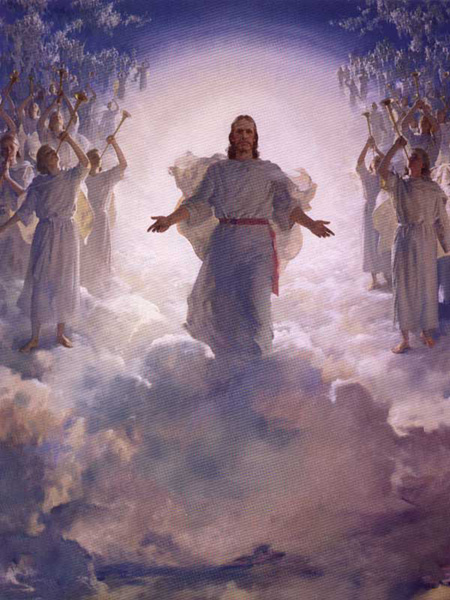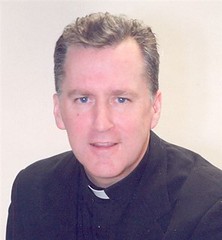
During the month of November, as we see things around us in nature die, the Church asks us to reflect on the mystery of life and death. The month began with the celebration of All Saints Day and All Souls Day. Throughout this month we are asked to pray for the dead, especially our friends, family and benefactors. Everyone on this earth at some time will experience the loss of someone they love and their own death too.
In the Gospel today Jesus reminds us that the goal of our life is eternal happiness in the Kingdom of Heaven. What I was taught as a child from the Old Baltimore Catechism still holds true today. We were created by God to love him and serve him in this life, and to share eternal happiness with him in the next.
Christians believe in the resurrection of the body. At the end of time, our that our bodies and souls will be reunited. God, who made everything out of nothing, will remake our bodies perfect, immortal and indestructible.
The Sadducees did not believe in the resurrection of the body. On the contrary, the levitirate law required the brother of a deceased man who was childless to marry his brother’s widow. They confront Jesus with a theoretical case of a poor woman who married and then lost seven husbands. They ask him whose wife will she be at the Resurrection, since all seven married her. Their intention was to make the whole question, about life after death, seem ridiculous.
Jesus replies by explaining that in heaven the blessed will not marry as they do in this life, but instead will be like the angels. Jesus could have quoted numerous texts in Scripture to demonstrate the evidence of the resurrection of the body. In the Second Book of Maccabees, a young man is being tortured and killed because he refuses to transgress Jewish law and eat pork. He says to his murderer “You accursed wretch, you dismiss us from this present life, but the King of the universe will raise us up to an everlasting renewal of life, because we have died for his laws." (2 Macc. 7, 9) Isaiah 26,19 says “But your dead shall live, their corpses shall rise; awake and sing, you who lie in the dust.” Daniel 12,2 says “Many of those who sleep in the dust of the earth shall awake; some shall live forever, others shall be an everlasting horror and disgrace.” However, the Sadducees only accepted the Torah, or the first five books of the Bible.
So Jesus meets them on their own ground by quoting from the Book of Exodus 3,6. “I am the God of your father, the God of Abraham, the God of Isaac, the God of Jacob.” If there was no life after death the Scripture would have said “I WAS the God of your father…” Instead, Jesus says “He is not the God of the dead, but of the living, for to Him all are alive.” (Luke 20,38)
This gives us confidence that we will see our deceased relatives and friends again in the Kingdom of Heaven. At the same time, we recognize that while we’re here on earth we must serve the Lord and prepare ourselves and our loved ones for eternity.
Christians believe in the resurrection of the body. At the end of time, our that our bodies and souls will be reunited. God, who made everything out of nothing, will remake our bodies perfect, immortal and indestructible.
The Sadducees did not believe in the resurrection of the body. On the contrary, the levitirate law required the brother of a deceased man who was childless to marry his brother’s widow. They confront Jesus with a theoretical case of a poor woman who married and then lost seven husbands. They ask him whose wife will she be at the Resurrection, since all seven married her. Their intention was to make the whole question, about life after death, seem ridiculous.
Jesus replies by explaining that in heaven the blessed will not marry as they do in this life, but instead will be like the angels. Jesus could have quoted numerous texts in Scripture to demonstrate the evidence of the resurrection of the body. In the Second Book of Maccabees, a young man is being tortured and killed because he refuses to transgress Jewish law and eat pork. He says to his murderer “You accursed wretch, you dismiss us from this present life, but the King of the universe will raise us up to an everlasting renewal of life, because we have died for his laws." (2 Macc. 7, 9) Isaiah 26,19 says “But your dead shall live, their corpses shall rise; awake and sing, you who lie in the dust.” Daniel 12,2 says “Many of those who sleep in the dust of the earth shall awake; some shall live forever, others shall be an everlasting horror and disgrace.” However, the Sadducees only accepted the Torah, or the first five books of the Bible.
So Jesus meets them on their own ground by quoting from the Book of Exodus 3,6. “I am the God of your father, the God of Abraham, the God of Isaac, the God of Jacob.” If there was no life after death the Scripture would have said “I WAS the God of your father…” Instead, Jesus says “He is not the God of the dead, but of the living, for to Him all are alive.” (Luke 20,38)
This gives us confidence that we will see our deceased relatives and friends again in the Kingdom of Heaven. At the same time, we recognize that while we’re here on earth we must serve the Lord and prepare ourselves and our loved ones for eternity.
The atheist Karl Marx called religion “the opiate of the people” because he thought our belief in the resurrection led us to be unconcerned about establishing justice on this earth. On the contrary, our faith in the Resurrection should lead us to be more concerned about fighting injustice. In his encyclical on the Eucharist Pope John Paul II wrote “Certainly the Christian vision leads to the expectation of “new heavens” and “a new earth” (Rev 21:1), but this increases, rather than lessens, our sense of responsibility for the world today. I wish to reaffirm this forcefully at the beginning of the new millennium, so that Christians will feel more obliged than ever not to neglect their duties as citizens in this world. Theirs is the task of contributing with the light of the Gospel to the building of a more human world, a world fully in harmony with God's plan. (Ecclesia de Eucharistia #20)
Our judgment will consist primarily how we treat those who are least among us. Special attention must be given in our times to fighting against the culture of death. Human life is not a commodity. God intended every human being to share everlasting happiness with him in heaven created. Thus every human life is precious. The image and likeness of God is present in every human being from the moment of conception, and must be respected till natural death. Only God can give life and only he has a right to take that life to himself.
If we put our faith in Christ, repent of our sins and work together to build a culture of life through our words, deeds and prayers, we will hear the words Jesus will address to the blessed at the end of time: “Come, you who are blessed by my Father. Inherit the kingdom prepared for you from the foundation of the world.” (Matthew 25, 34) If we are faithful to Christ and put his teachings into practice in our lives, we can be confident that we will enter the Kingdom of Heaven. We will see those we love again, and God will remake our bodies perfect, immortal and indestructible.
Our judgment will consist primarily how we treat those who are least among us. Special attention must be given in our times to fighting against the culture of death. Human life is not a commodity. God intended every human being to share everlasting happiness with him in heaven created. Thus every human life is precious. The image and likeness of God is present in every human being from the moment of conception, and must be respected till natural death. Only God can give life and only he has a right to take that life to himself.
If we put our faith in Christ, repent of our sins and work together to build a culture of life through our words, deeds and prayers, we will hear the words Jesus will address to the blessed at the end of time: “Come, you who are blessed by my Father. Inherit the kingdom prepared for you from the foundation of the world.” (Matthew 25, 34) If we are faithful to Christ and put his teachings into practice in our lives, we can be confident that we will enter the Kingdom of Heaven. We will see those we love again, and God will remake our bodies perfect, immortal and indestructible.

No comments:
Post a Comment